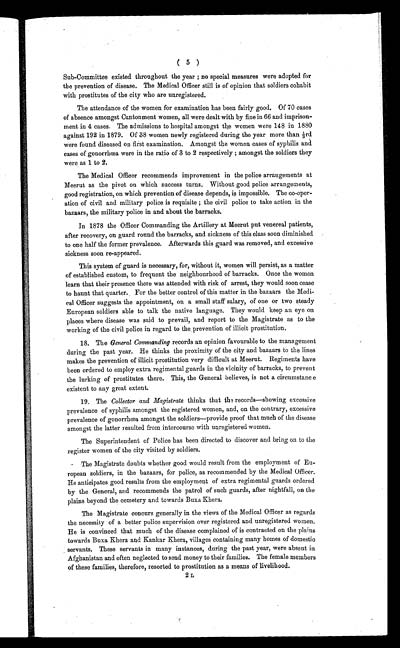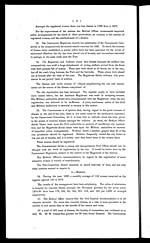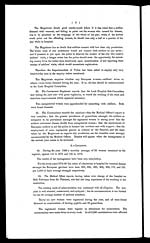Medicine - Institutions > Lock hospitals > Annual report on the working of the lock hospitals in the North-Western Provinces and Oudh > Seventh annual report of the working of the lock hospitals in the North-Western Provinces and Oudh for the year 1880
(235) Page 5
Download files
Individual page:
Thumbnail gallery: Grid view | List view

( 5 )
Sub-Committee existed throughout the year ; no special measures were adopted for
the prevention of disease. The Medical Officer still is of opinion that soldiers cohabit
with prostitutes of the city who are unregistered.
The attendance of the women for examination has been fairly good. Of 70 cases
of absence amongst Cantonment women, all were dealt with by fine in 66 and imprison-
ment in 4 cases. The admissions to hospital amongst the women were 148 in 1880
against 192 in 1879. Of 38 women newly registered during the year more than 1/3rd
were found diseased on first examination. Amongst the women cases of syphilis and
cases of gonorrhœa were in the ratio of 3 to 2 respectively ; amongst the soldiers they
were as 1 to 2.
The Medical Officer recommends improvement in the police arrangements at
Meerut as the pivot on which success turns. Without good police arrangements,
good registration, on which prevention of disease depends, is impossible. The co-oper-
ation of civil and military police is requisite ; the civil police to take action in the
bazaars, the military police in and about the barracks.
In 1878 the Officer Commanding the Artillery at Meerut put venereal patients,
after recovery, on guard round the barracks, and sickness of this class soon diminished
to one half the former prevalence. Afterwards this guard was removed, and excessive
sickness soon re-appeared.
This system of guard is necessary, for, without it, women will persist, as a matter
of established custom, to frequent the neighbourhood of barracks. Once the women
learn that their presence there was attended with risk of arrest, they would soon cease
to haunt that quarter. For the better control of this matter in the bazaars the Medi-
cal Officer suggests the appointment, on a small staff salary, of one or two steady
European soldiers able to talk the native language. They would keep an eye on
places where disease was said to prevail, and report to the Magistrate as to the
working of the civil police in regard to the prevention of illicit prostitution.
18. The General Commanding records an opinion favourable to the management
during the past year. He thinks the proximity of the city and bazaars to the lines
makes the prevention of illicit prostitution very difficult at Meerut. Regiments have
been ordered to employ extra regimental guards in the vicinity of barracks, to prevent
the lurking of prostitutes there. This, the General believes, is not a circumstance
existent to any great extent.
19. The Collector and Magistrate thinks that the records—showing excessive
prevalence of syphilis amongst the registered women, and, on the contrary, excessive
prevalence of gonorrhœa amongst the soldiers—provide proof that much of the disease
amongst the latter resulted from intercourse with unregistered women.
The Superintendent of Police has been directed to discover and bring on to the
register women of the city visited by soldiers.
The Magistrate doubts whether good would result from the employment of Eu-
ropean soldiers, in the bazaars, for police, as recommended by the Medical Officer.
He anticipates good results from the employment of extra regimental guards ordered
by the General, and recommends the patrol of such guards, after nightfall, on the
plains beyond the cemetery and towards Buxa Khera.
The Magistrate concurs generally in the views of the Medical Officer as regards
the necessity of a better police supervision over registered and unregistered women.
He is convinced that much of the disease complained of is contracted on the plains
towards Buxa Khera and Kankar Khera, villages containing many homes of domestic
servants. These servants in many instances, during the past year, were absent in
Afghanistan and often neglected to send money to their families. The female members
of these families, therefore, resorted to prostitution as a means of livelihood.
2L
Set display mode to: Large image | Zoom image | Transcription
Images and transcriptions on this page, including medium image downloads, may be used under the Creative Commons Attribution 4.0 International Licence unless otherwise stated. ![]()
| Permanent URL | https://digital.nls.uk/75111576 |
|---|




